Scrum tools have become quite famous in the field of project management. They help you manage your team and projects effectively and enable smooth collaboration and faster time-to-market, among other benefits.
These tools facilitate scrum methodology encompassing commitment, respect, courage, focus, and openness – values that establish a good business culture. Apart from offering quality products, businesses must incorporate these values that can lead them to build higher customer trust.
Thankfully, businesses nowadays have started recognizing these concepts and embracing agile and Scrum methodologies. This has given rise to the growth of scrum tools, and now you can find plenty of options.
And to make it easy for you to choose the best scrum tool for your business, I’ve simplified things for you in this article. It explains a few things about Scrum, scrum tools, their benefits for your business, and the best tools to compare.
Here are some of the best scrum tools for you to consider for your next project. And, if you’re a beginner to Scrum, you can scroll down to the end of the list for a detailed look at Scrum and its uses.
- 1. monday.com
- 2. Smartsheet
- 3. Miro
- 4. Jira
- 5. Quickscrum
- 6. Hubstaff Tasks
- 7. Azure Boards
- 8. Orangescrum
- 9. Taiga
- 10. VivifyScrum
- 11. Asana
- Show less
You can trust Geekflare
At Geekflare, trust and transparency are paramount. Our team of experts, with over 185 years of combined experience in business and technology, tests and reviews software, ensuring our ratings and awards are unbiased and reliable. Learn how we test.
1. monday.com
Get the flexible, agile management software that your team needs in a dynamic environment. monday.com makes cross-functional work easy. From pre-planning and development to user feedback, everyone will get agile methodologies in a single platform. It is easy for agile teams, first-timers, and Scrum masters to check their work in views, such as a Kanban board.
Also Read: Best Kanban Tools for Effective Team Management
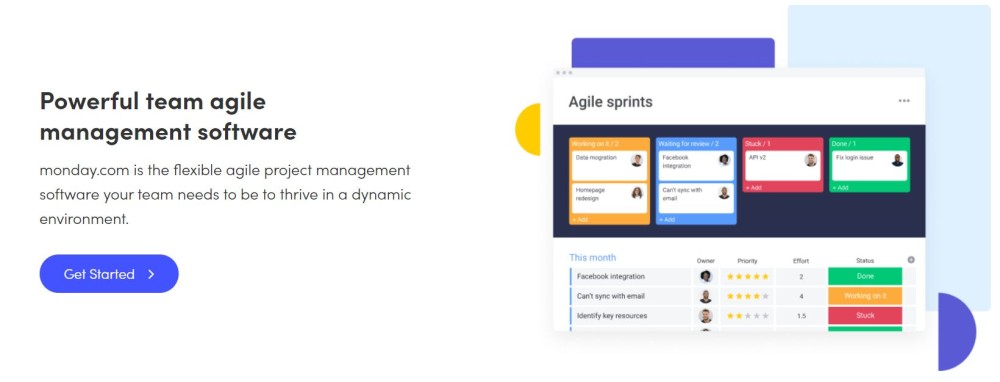
monday.com provides real-time reports that show the team’s progress, continuous improvement, and product backlog (you can learn how to prioritize product backlog with our guide). You can track bugs and report them easily in a single place and prioritize each issue with colour-coded labels so that your team can know which bugs are critical.
Plan sprints according to your team and divide work between members to make it less complex. In addition, launch products successfully and plan each phase. It will help you determine who exactly is working on what and when.
monday.com is FREE forever for up to 2 seats and costs £8/seat/month if your team is bigger.
2. Smartsheet
Businesses with Agile teams can use Smartsheet — a simple scrum software that offers easy online boards. This flexible platform empowers your team by matching the team requirements and adapting to changes.
This cloud-based project management solution is ideal for ideating, organizing, and managing organizational workflow. It supports Scrum methodology with features like task prioritization and customized sprint data. As a result, product owners and stakeholders can make well-informed and data-driven decisions.
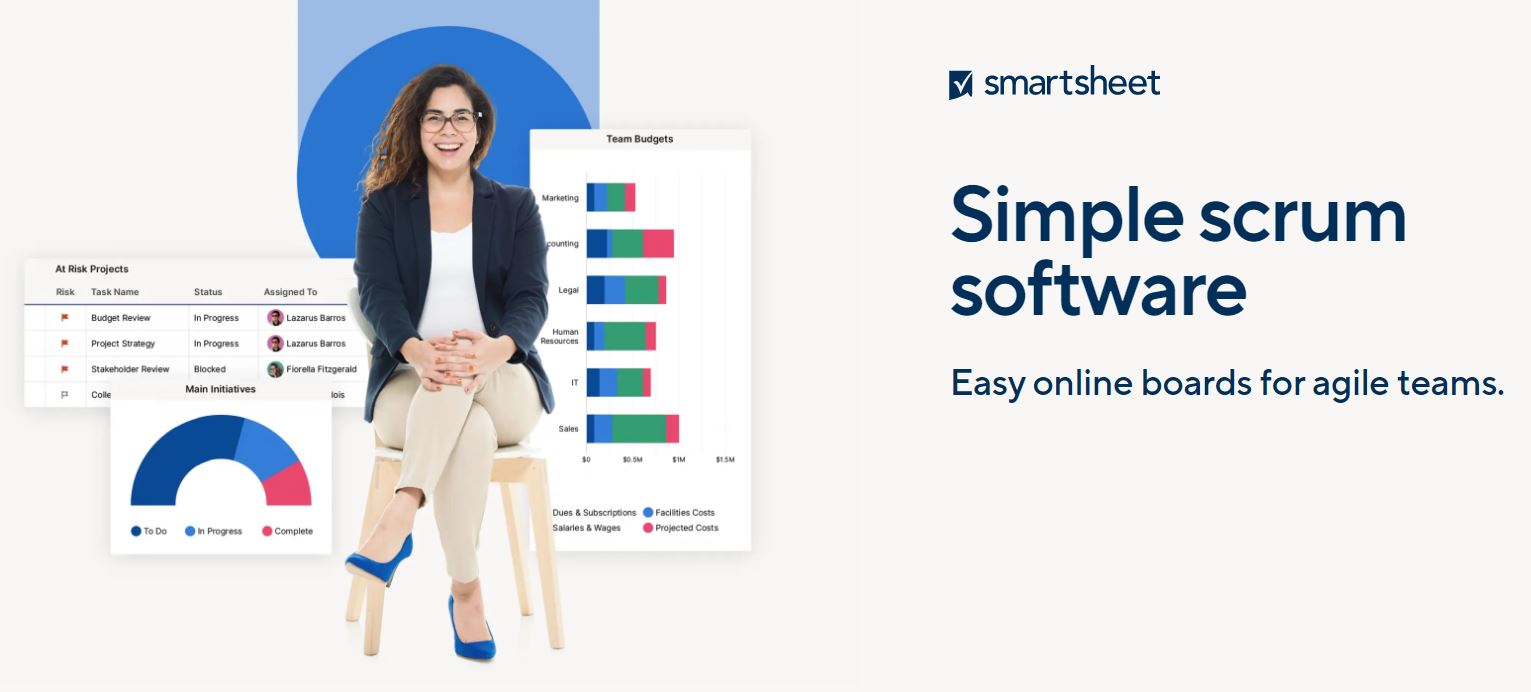
Smartsheet offers a range of templates that you can use to easily get started with your Scrum board. Though its default view looks like a spreadsheet, web app users can also switch to the card, Gantt, and calendar view. You can create a Scrum board on this platform using the Card view. Moreover, Smartsheet has a highly visual and flexible interface suitable for easy collaboration.
Smartsheet has a free plan for one user and two editors. Teams can opt for any of its subscription plans, starting from £7/user/month. All plans come with a free trial.
3. Miro
Miro is the definitive agile tool for agile teams that helps you put your ideas into real action with boards like Kanban, Jira, Asana, and more. Instead of working hard on documentation, engage remote users for sprint planning and retrospectives online. You can also create story maps, organize tasks, and prioritize the backlog into sprints using Kanban boards.
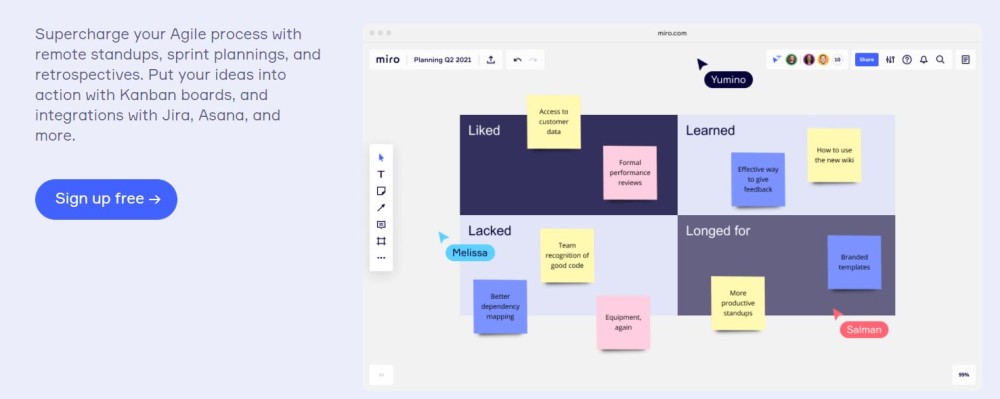
Use over 120 templates to start your journey and import tasks from Asana, Rally, Azure, or Jira into Miro and visualize the big-picture tasks to coordinate and discuss with your team. You can manage workloads, make adjustments, and draw dependency lines to stay focused and on track.
In addition, apply Agile methodologies with flexibility across squads, Scrum, or tribes teams and enable cross-team work in the single platform and scale processes.
Miro is FREE for unlimited team members, but the limit is on board. Get more collaborative power as well as unlimited boards at $8/member/month.
4. Jira
Jira is one of the best development tools that is used by agile teams. It is built to ease the work for each team member to track, plan, and develop great products. It helps you create issues and user stories, distribute tasks, and design sprints across your team plus prioritize your teams’ work and discuss in full context with complete visibility.
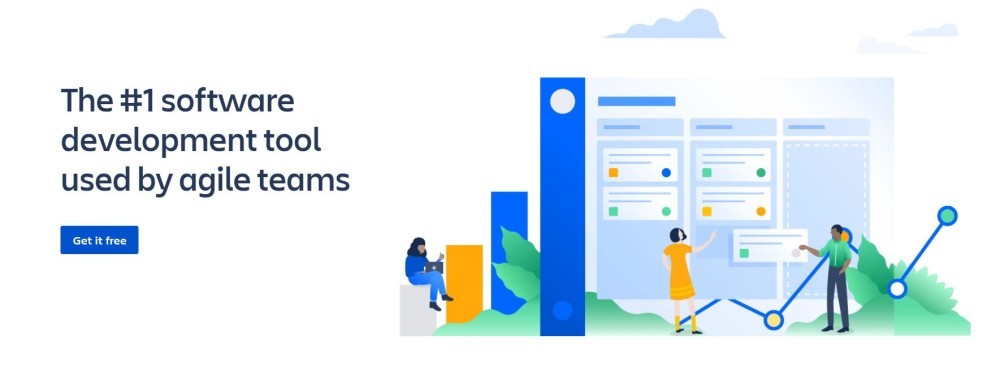
Make sure whatever you have is always up-to-date so that you can ship with better confidence. You can also improve your teams’ performance based on visual and real-time data and allow them to work on that part for improvement.
Every member has a unique process, and every team is different in shipping software. This is why Jira enables you to create a workflow or use an out-of-the-box workflow to match your operations.
Also Read: Best Workflow Automation and Integration Platforms for Personal or Business
You can enhance the product using the best integration tools and let your team work faster and better. Additionally, build smarter plans for your members and organization to ship more reliably and faster, stay focused, and work better with Jira automation to save more time.
Jira offers you the surety of safe and secure software for your organization that comes with enterprise-grade solutions. It’s backed by enforced 2-step verification, SAML SSO, automated user provisioning, and more. They also offer a 99.99% uptime guarantee, unlimited storage, premium support, and more.
For up to 10 users, Jira software is FREE every month. If your team size is between 1-100, the price is $7.53/month, free for 7 days.
5. Quickscrum
Quickscrum provides an efficient Scrum tool for teams to perform sprint grooming, sprint retrospective, sprint review, daily stand-up, and sprint planning. It helps you manage, prioritize, and split stories to deliver proper value. You can even plan single or multiple tasks at a time to align your team’s vision and deliver faster.
Use Quickscrum to manage the availability of members within the sprint and visually track progress from the Scrum board to collaborate with your team with accurate results. You can also list all the feedback and act upon them instantly to improve your service.
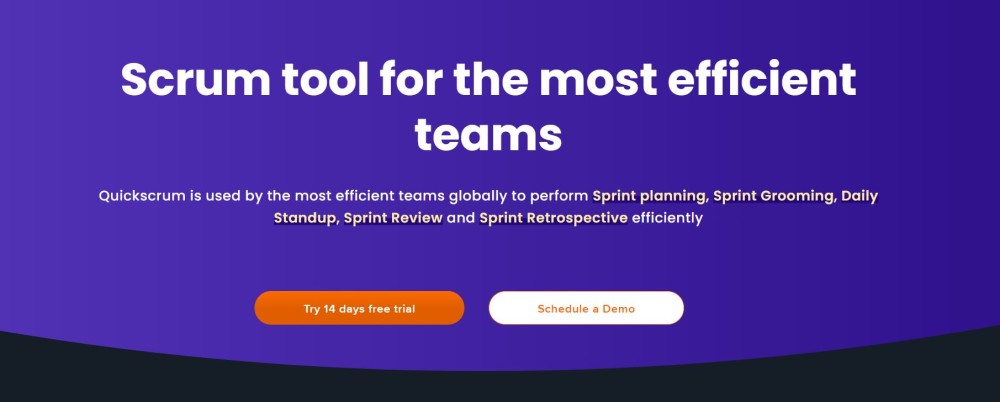
Furthermore, track individual or team progress within the sprint and opt for a daily team health report. You can also see the difference between planned work and completed work easily.
In addition, you will find many reasons to choose Quickscrum, such as an all-in-one Scrum tool, customer success manager, free onboarding training, process consulting, coaching, customization, integration, data migration, and more.
Get Quickscrum at $5/user/month and take the FREE trial.
6. Hubstaff Tasks
Reach higher productivity levels with Hubstaff Tasks, an agile project management software that allows your team members to approach more with less effort. It will help in enhancing communication and collaboration between teams.
With Hubstaff Tasks, you can finish your big jobs faster, prevent mistakes through routine check-ins, spot minor issues, and foster teamwork. You will also be able to discover the simplest way to plan sprints and stay on top of what is getting done.

Set custom workflows to move your tasks faster by avoiding task re-assigning. Check what everyone is doing and prompt your team to update with daily or weekly status. You can even make your personal to-do lists to check what is to be done today, tomorrow, and next week.
Analyze how much time is needed for every task and gain complete insights through Hubstaff time-tracking software. It also saves your time with 40+ customizable templates for every type of project. Switch between different views to understand your team’s work.
Hubstaff Tasks is FREE for a maximum of 5 users and costs you $4.17/user for more benefits. Take a 14-day free trial of the paid plan to understand it better.
7. Azure Boards
Discuss, track, and plan work with your teams through Azure Boards and rack every work with Kanban boards, team dashboards, custom reporting, and backlogs. You can also combine comprehensive traceability with flexible work items and drag-and-drop sprint planning to get the perfect house of ideas from big to small.
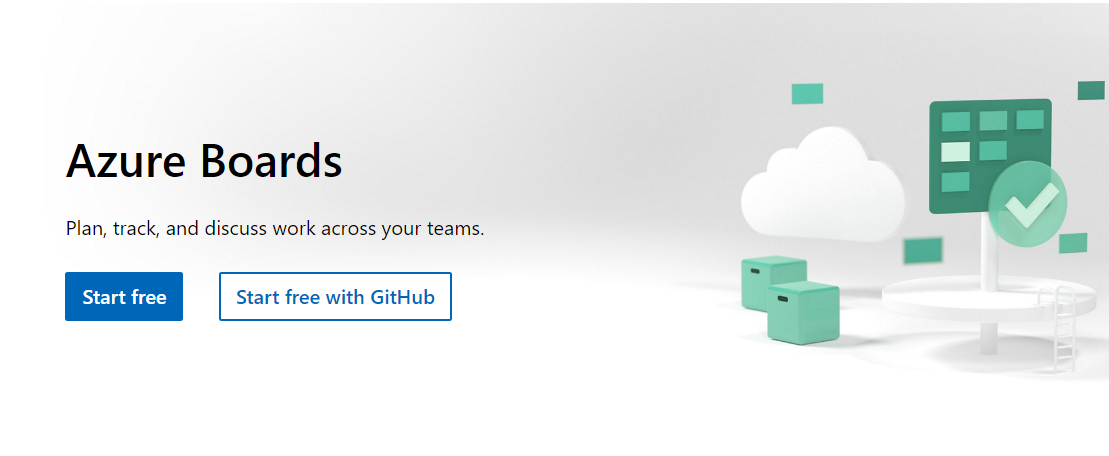
Keep track of your ideas at each development stage and align your team with the code changes linked with your work items. You can also help your teams run stand-ups and plan meetings and sprints with built-in scrum boards. The tool offers insights into the status and health of the project with dashboard widgets and powerful analytics tools.
Connect your GitHub repository, start linking PRs and commits to the work items, and use productivity tools to scale your business. Try Azure Boards for FREE, or get the best value of your cloud journey at each stage.
8. Orangescrum
Complete your project successfully within budget and on time with Orangescrum and become 47% more productive, increase up to 61% profit, and improve up to 69% CSAT. Break the task from start to finish and assign every task to a different team member to successfully complete the project. It helps you track their workload and make the right decision at the right time.
Take a complete view of resources and tasks with Scrum, Kanban boards, and reports. Execute each task with clarity through custom status, task labels, task types, and task linking. You can also manage user roles, tasks, track time, utilize resources, and get task reports. Orangescrum also functions as a decent Gantt chart software for your projects.
Also Read: Time Tracking Software for Teams
Orangescrum helps you manage the task, time, and resources to move your organization forward and make customers happy. Its pre-built templates allow you to develop the product, manage content, track bugs, and more.
Take a free trial of 14-days and get access to all the features. Or, choose a plan for up to 10 users at $8.19/month and avail yourself of a 30-day money-back guarantee. It will give you unlimited projects, tasks, subtasks, time tracking, and 100GB storage for entirely free up to three users.
9. Taiga
Deliver promised functionality within your budget and on time with the Taiga project management tool. It has rich features and is very simple to start with its intuitive user interface. Define deliverables with your teams and capture teams’ knowledge for secure buy-in.
Align deliverables and prioritize each with the end-user and ensure that the highest priority deliverable would be completed within the time. Share progress and discuss the issues to create a risk-free environment for the individuals and teams.
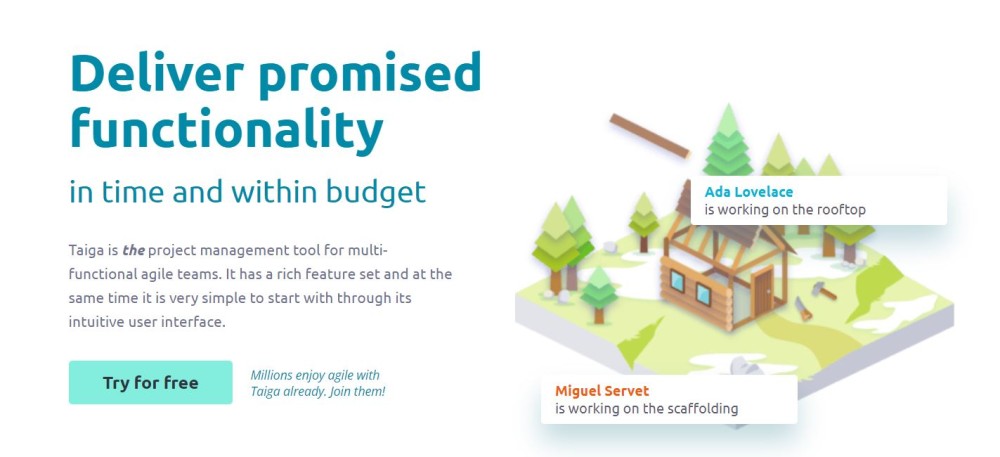
It lets you offer greater transparency to your end-users and better understand your effort for each deliverable. Change workflows when needed and activate new features to improve productivity. You will also get reliability, quality, independence, adaptability, flexibility, transparency, performance, stability, and security.
Scrum is the complete set of boards to show and plan individual sprints from the backlog, including EPICS and sub-tasks. You will also find a sprint task board along with swim lanes for every user zoom function and story.
Taiga also doubles as an excellent open source project management software, and is FREE for up to 15 users, up to 5 private projects, unlimited public projects, and up to 300MB of storage. Get more storage and unlimited functions at just $5/user/month and take the free trial.
10. VivifyScrum
Unlock the unlimited number of boards, tasks, and workspaces with VivifyScrum. It is a web-based project management tool for large organizations and small agile teams that lets you handle all the projects from a single place.
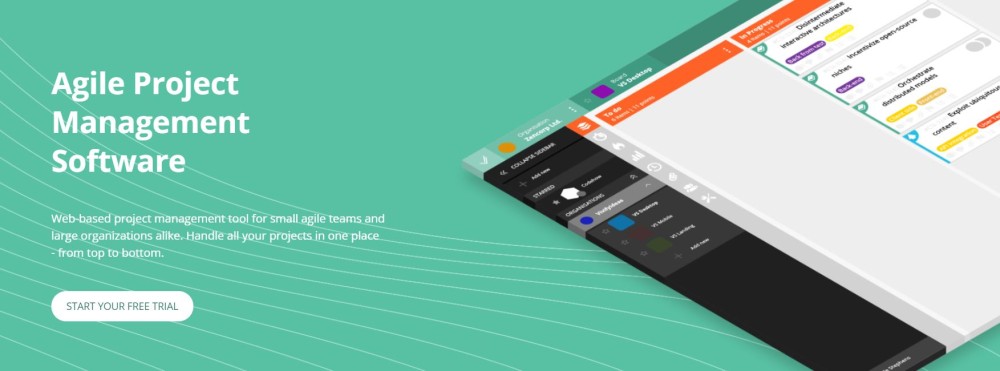
VivifyScrum provides an all-in-one solution, from managing projects to sending invoices. You will get unlimited Kanban and Scrum boards along with unlimited items. You can also manage processes efficiently by tracking project progress and teams’ work.
Also Read: Kanban vs Scrum: Differences
Set up the fully customizable Scrum board and efficiently collaborate with your teams. You can gain complete insight into each member’s availability and track their workload. In addition, use the VivifyScrum Time Tracker tool to track the time you spend on automatic workloads and tasks.
Use every feature for your team of up to 10 members at just $96/year and get unlimited boards, and organizations. Avail yourself of a 7-day FREE trial.
11. Asana
Manage agile projects with Asana, a project management tool that enables your team to move faster and get effective results. It helps you plan, organize, and manage Scrum sprints in a collaborative tool as your team and flexible.
Asana has every feature your team needs, from boards and timelines to dependencies and custom fields. Track iterations and launches, simplify sprint plans and agile project processes, and communicate effectively with your members to enhance your business growth.
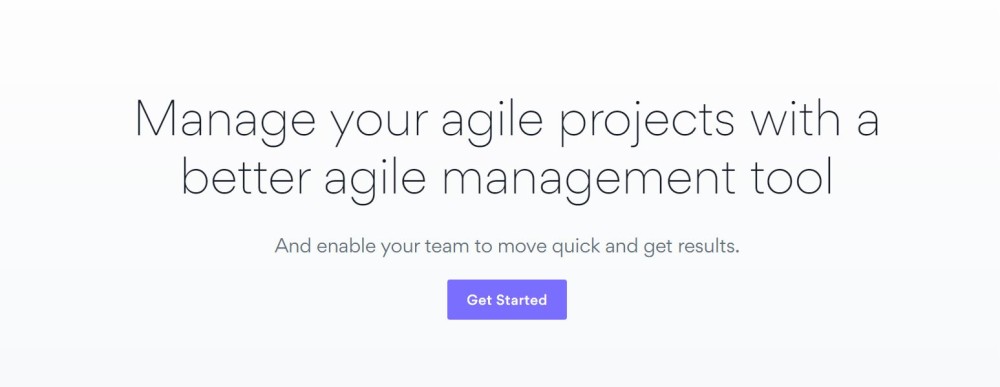
Track and file bugs in a single place and prioritize them according to the availability of the members. Give full transparency of the workflow to your team to avoid guesswork. Asana brings many applications together so that you can feel free to use any of the apps to manage effectively. It helps reduce errors, spend less time on routine, and streamline processes.
For individuals or small teams, Asana comes with a FREE plan and offers unlimited tasks, projects, messages, activity logs, file storage, and a lot more. Get advanced features with a paid plan at £9.49/user/month.
And with that, you now have a decent idea about all the different scrum tools that are available for use today. As promised earlier, let’s dive more into scrum tools, what they are, and how they function.
What Are Scrum Tools?

Scrum tools are software systems used for project management. They are based on a scrum framework – a part of the agile methodology used especially for software development.
Scrum tools offer features and capabilities tailored to improve project management processes, product quality, and team collaboration based on scrum techniques like sprints, burndown charts, story points, scrum meetings, and more. These tools allow teams to plan, track, and manage scrum projects effectively by providing a single dashboard to handle all the processes.
But what is Scrum?
Now, in order to understand Scrum tools, it’s pertinent to have an idea of Scrum.
Scrum, in project management, is a framework that helps software development teams work together in a streamlined way. It is a methodology for developing, building and delivering products with better speed, quality, and efficiency.
In this methodology, complex projects are broken down into smaller parts, and the workload is also divided into shorter periods called “sprints”. This offers an effective way to manage projects, emphasizing quick feedback and continuous improvement.
For example, suppose a team witnesses any inefficiency in a process. In that case, they can resolve it quickly as the task is divided into smaller parts, and daily meetings are held to review. This way, team members can receive quick feedback from the responsible stakeholders to improve. Scrum’s fundamental unit is a small team containing:
- A product owner who is accountable for maximizing team deliverability and ensuring sound output
- A scrum master who is accountable for eliminating obstacles for the team so they can achieve the product goals within time
- Developers or the team members who help build the products
Developers are not only software developers. Instead, this term applies to all the team members, such as programmers, researchers, designers, architects, analysts, statisticians, engineers, testers, data specialists, etc.
Apart from software development, scrum methodology is also applied in other fields, such as emerging technologies, sales and marketing, research, and more.
Great! Now you’re aware of scrum and also how scrum tools function. But, how exactly do they benefit your project? Let’s find out.
What’s the Use of Scrum Tools?
Scrum tools are employed for project management, a broad term with many tasks and processes. It may involve:
- Running sprints: Scrum tools help a team to run sprints by allowing them to manage the backlog, assign tasks, and divide complex tasks into smaller tasks.
- Collaborating: Scrum tools work on scrum techniques that help in effective collaboration among your team members. It keeps the entire team focused and motivated and makes feedback easy to incorporate so the developers can improve where necessary.
- Enabling transparency: Scrum tools offer transparency by adhering to scrum values. It will display who’s working on which task and its progress. It will keep all the members on the same page for greater transparency.
- Accelerating work: You can look at the dashboard and understand the status of all the work that’s going on, completed, and pending. It will help you determine if you lack the speed to improve on it to make the delivery on time with quality.
So, with all these excellent features and the proper streamlining of work processes, scrum tools can be pretty helpful. However, most of these tools are paid (for long-term use). So, should you invest in them?
Why Should You Use Scrum Tools?
You may think using one more software tool in your business would be costly, challenging to manage, and get in the way of your development. However, it’s not the case.
Here’s why using scrum tools can benefit start-ups to medium businesses.
Better Product Quality

Every project has a definite goal. Using project management software like Scrum tools can help you achieve that goal easily and quickly, ensuring quality deliverables that your end-users or clients love. These tools offer the right methodologies and project framework to help you plan, execute, and complete the task with quality.
It can act as a single point of reference to clarify the project requirements so that the team members won’t have any confusion or feel the need to ask the superiors multiple times for better clarity.
Effective Collaboration
The entire team can work together effectively with a defined product owner, scrum master, and developers. It will facilitate daily scrum meetings so that tasks can be reviewed daily. It can help the team understand where to improve and where to head next. They can also seek guidance where they feel necessary and become aware of the tasks’ progress.
Faster Time to Market
Scrum tools help accelerate project development compared to traditional setups. It’s one of the two components of the agile framework for software development that emphasizes speed with quality.
Also Read: Agile Frameworks: A Simple [But Comprehensive] Guide
Thus, you can deliver the product quickly in the market and see how it performs. It will give you a good time to take the feedback from the end-users and improve the product, which will help deliver more value to customers and lead to higher satisfaction rates.
Increased ROI
When you deliver value to your customers, you can see higher adoption of your products in the market. It will help increase your return on investment, and you can make good profits. It’s because you can deliver the products quickly, take feedback early, and make improvements in time to delight the customers.
Seems interesting?
I hope I’ve convinced you well enough to consider investing in a decent scrum tool. But not all scrum tools are the same. Some are filled with too many features that can seem like bloatware, while others may not have what you’re looking for. So, how do you choose one that fits your requirements like a glove?
Things to Consider Before Choosing A Scrum Tool 👇
There are plenty of scrum tools in the market, each with impressive features and plans to attract you. But how would you know which one is best for your business needs and budget?
So, let’s look at some of the factors to consider before you choose a scrum tool.
- A good scrum tool should help you run Sprints easily by letting you prioritize backlogs, divide complex tasks, assign tasks, and go deeper into insights.
- It must offer you an effortless way to create backlogs that work like whiteboards to list project requirements, tasks, responsibilities, and other details. It will help you divide the tasks and understand their significance more so you can make better decisions.
- The scrum tool you choose must have an easy-to-use interface for all team members so they can use it without needing greater technical skills.
- Check the pricing, and shortlist the ones based on your budget. You can also compare the pricing against features to choose the best combination.
Now, you’re well equipped to do your own research in finding a scrum tool that meets your needs. Of course, the ones I’ve mentioned here in this list are the best around. So, it shouldn’t be too much work for you to choose one.
Conclusion 👩💻
Scrum tools can help you manage your projects effectively while offering many benefits, such as smooth collaboration, faster time to market, higher ROI, and customer satisfaction. This list of the best scrum tools will help you pick the best one based on your budget and feature requirements.

